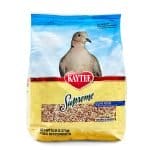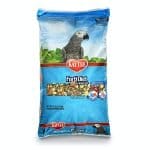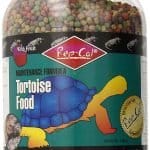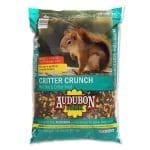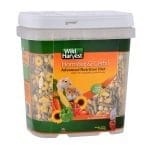Ultimate Guide to the 5 Best Food for Pet Rats: Best Diet Tips for a Healthy Rat
Rats are very intelligent. They are also social animals that make great pets. However, just like humans, they require a balanced diet to stay healthy and happy. And keeping your little whiskered companions healthy starts with what we toss in their bowl. We often think rats will munch on anything, but just like us, they thrive on a diet that’s balanced and fills their nutritional needs. Introducing new grub into a rat’s diet isn’t a free-for-all; it’s more like easing into a hot bath. Do it slowly over a few days to avoid any tummy troubles. An ideal platter for most fur-balls includes commercial rat nuggets, ensuring they get that perfect mix of nutrients without piling on the pounds.
But hey, variety is the spice of life, right? Alongside those nuggets, small servings of fresh fruits and veggies keep things interesting. And for those momentous occasions, a little bit of lean meat, an egg here, or a chickpea there, makes for delightful occasional treats. We have to say that watching the scale is crucial, though; we don’t want your furry friends gaining too much weight. Little nibbles, not full-blown feasts, are the way to go.
What Should You Feed Your Pet Rat?
Understanding Rat Nutrition for Optimal Health
To be honest, rats aren’t picky eaters, but that doesn’t mean they should live on leftovers. Being omnivores, they require a mix of plants and meats to stay in tip-top shape. Wild rats might be able to do with seeds, grains, and the odd insect, but your domestic buddies rely on us to keep their diet balanced. This is why we believe your home pets deserve the gold standard treatment. This means you need to look for pelleted foods specially formulated for rats. These hold a protein content between 14 to 16 percent, and fat with a mere 8 percent or lower. Large pellets or lab blocks are usually a solid choice, laying the foundation for a diet that keeps them healthy and hearty.
In essence, rats are omnivores, which means they require a diverse diet that includes both plant and animal-based foods. Providing a balanced diet is essential for their overall health and well-being. It’s crucial to offer a variety of foods to meet their nutritional requirements.
Essential Nutrients That Pet Rats Need – Understanding Why to Include the Best Food for Pet Rats
Getting down to brass tacks, rats need their food to be rich in proteins and fats. However, it’s the vitamins and minerals that round out their diet. So which one to choose from? Store-bought pellets or lab blocks? Well, these are both good choices so you can alternate between the pellets and lab blocks. Both are packed with everything a rat needs. They include calcium for strong bones and teeth, vitamin D for processing that calcium, B vitamins for brain function, and Vitamin C to fend off sickness. With a base of pellets or blocks, and a smattering of fruits and veggies, your rats get all the essential nutrients without needing extra supplements that could knock things out of balance.
In summary, a well-balanced rat diet should consist of high-quality rat pellets (you can buy these in many local stores), fresh fruits, and vegetables. These pellets are specially formulated to meet the nutritional needs of pet rats, ensuring they receive essential vitamins and minerals. Additionally, offering a variety of fruits and vegetables provides enrichment and helps mimic their natural foraging behavior.
How to Ensure a Balanced Diet for Your Rat
To maintain a well-balanced diet for your pet rat, it’s essential to provide small amounts of food throughout the day. Monitor their intake to prevent overeating and obesity. Ensure they have access to fresh water at all times to stay hydrated and healthy.
5 Top-Rated Foods for Your Pet Rat – Best Food for Pet Rats
Finding the Best Food for Pet Rats can feel like navigating a maze. But don’t fret; there are top-of-the-line options that cater to all their dietary needs. Here are five stellar choices that have gotten two tiny thumbs up from rats (if they had thumbs, that is). They range from comprehensive, nutrient-dense pellets designed specifically for adult rats, to variety-packed foraging blends that mimic the natural eating habits of wild rats. Each one brings something special to the table, ensuring your pets not only live, but thrive with energy.
1. Oxbow Essentials Adult Rat Food – Best Overall
Oxbow Essentials hits the nail on the head, offering a formula that’s just right for adult rats. Loaded with the balance of nutrients your pets need, it leans heavily on the side of health. Rats might not know the difference between good and bad food, but their bodies sure do.
This brand provides a solid foundation for their diet, ensuring they get everything they need without the risk of overindulgence. Plus, it’s widely available, making it easy to keep your rats on the straight and narrow, nutrition-wise.
2. Supreme Petfoods Science Selective Rat Food – A Premium Alternative
For those looking to splurge a bit on their pet’s diet, Supreme Petfoods Science Selective is a premium choice that doesn’t skimp on quality. Its special formulation caters specifically to the nutritional needs of rats, ensuring a balanced meal with every bite.
While its price tag might be a bit higher, the investment in your rat’s health is worth every penny. It bridges the gap between regular and exceptional rat nutrition, making it a go-to for those dedicated to providing the best for their furry companions.
3. Kaytee Forti-Diet Pro Health – Best Budget Option
Kaytee Forti-Diet Pro Health is the superhero of budget-friendly rat food. It packs a nutritional punch without knocking out your wallet. Its formulation is designed to cater to the essential needs of rats, ensuring they’re not missing out on anything despite the lower price point.
For pet owners conscious of their spending but unwilling to compromise on their rat’s health, this is the golden ticket. It demonstrates that premium nutrition doesn’t always have to come with a premium price tag.
4. Mazuri Vegetarian Rat and Mouse Diet – Best Blocks
Mazuri’s Vegetarian Diet blocks are a game-changer for those looking to keep their rat’s diet plant-based. Engineered to meet every nutritional requirement, these blocks are convenient, mess-free, and pack a wallop of health benefits.
It’s an ideal choice for ensuring your little friends get all the goodness they need without resorting to animal proteins. These blocks are more than just food; they’re a commitment to a lifestyle, proving that nutrition can be both ethical and comprehensive.
5. Vitakraft Vita Smart Natural Forage Blend – Best Forage Blend for Variety
The Vitakraft Vita Smart Natural Forage Blend is all about bringing some excitement to your rat’s diet. Mimicking the varied diet they’d have in the wild, this forage blend encourages natural foraging behaviors while ensuring they’re getting a wide range of nutrients.
It’s a game of hide-and-seek they can eat, promoting not just physical health but mental stimulation as well. This blend is a testament to how variety in diet can keep your furry friends both happy and healthy.
Why Forage Blends Stimulate Natural Behavior
Forage blends do more than just fill a belly; they tickle a rat’s curiosity and encourage their natural foraging instincts. By providing a mix of textures and flavors, you’re not just nourishing them; you’re giving them a puzzle to solve. This kind of mental stimulation is crucial for keeping your pets engaged and happy. There’s joy in digging through a blend to find their favorite bits, making mealtime both a feast and an adventure. Plus, it helps reduce health issues by keeping them active and preventing overeating, showcasing the brilliance behind the design of forage blends.
How to Prevent Obesity in Pet Rats When Feeding them the Best Food for Rats?
Identifying Signs of Obesity in Rats
Obesity is a common issue in pet rats. Signs of obesity include a visibly larger body size, difficulty moving, and reduced activity levels. Regularly monitoring your rat’s weight and body condition can help identify potential weight problems early on.
Effective Diet Modifications to Help Combat Obesity
If you notice signs of obesity in your rat, consider making diet modifications. For instance, you can reduce the amount of high-fat and sugary foods in their diet. You can also increase their access to fresh foods. But you should ensure and promote regular exercise to help them maintain a healthy weight.
Importance of Regular Exercise for Your Pet Rat
Exercise is crucial for preventing obesity and promoting overall health in pet rats. Provide opportunities for physical activity by setting up a spacious cage with platforms, tunnels, and toys for them to explore. Encourage playtime outside the cage under supervision to keep them active and engaged.
What Foods Should You Avoid Feeding Your Pet Rat?
List of Foods Harmful for Rats
Some foods can be harmful to pet rats and should be avoided. These include sugary treats, high-fat foods, and items with low nutritional value. Additionally, foods like sunflower seeds and peanuts should be offered in moderation due to their high fat content.
Dangers of Sugary and Fatty Foods for Pet Rats
Sugary and fatty foods can lead to obesity and other health issues in pet rats. These foods offer little nutritional value and can contribute to weight gain. It’s important to prioritize a diet rich in essential nutrients and avoid excessive treats that can harm their health.
Impact of Sunflower Seeds and Peanuts on Your Rat’s Health
Sunflower seeds and peanuts are popular treats among rats, but they should be provided sparingly. While these foods are enjoyed by rats, the high fat content can lead to obesity if given in large quantities. Offer these treats as an occasional snack rather than a primary source of nutrition.
How to Provide a Well-Balanced Diet for Rats of Different Ages?
Special Considerations for Feeding Young Rats
Youthful rats have specific dietary requirements to support their growth and development. Ensure that young rats receive a diet rich in protein and essential nutrients to promote healthy bone and muscle growth. Offer age-appropriate rat pellets and fresh foods to meet their nutritional needs.
Adapting Diet for Senior Rats
As rats age, their metabolism slows down, and their nutritional needs may change. Senior rats may require a diet lower in fat and protein to maintain a healthy weight and support their aging bodies. Consult with a veterinarian to determine the best diet for your senior rat.
Nutritional Requirements for Rats in Different Life Stages
Rats have varying nutritional requirements throughout their life stages. It’s essential to provide a diet that meets their specific needs based on factors such as age, activity level, and overall health. By offering a well-balanced diet tailored to their life stage, you can help your rat thrive and live a healthy life.
Final Thoughts on Selecting the Best Food for Your Rat
Ending on a high note, the art of feeding your rat isn’t about extravagance; it’s about hitting those nutritional requirements spot on. Young rats, just like kiddos, have different needs compared to the adults, especially when it comes to protein levels. Vegetables and fruit, well, they’re like hitting the jackpot in rat nutrition – but let’s not forget about the potential for a well-balanced diet offered by pellet diets. And as for those seed mixes? Think of them as the occasional sprinkle of joy in an otherwise balanced feast. So, while the temptation to turn your rats into tiny gourmands is real, your focus should always tilt towards ensuring their health with every bite. As for treats like hard-boiled eggs and cottage cheese, consider them the cherry on top of a nutritionally rich cake. In the grand scheme, it’s all about love, care, and a dash of nutritional wisdom.
FAQ on the Best Food for Your Rat
Q: Benefits of Seeking Professional Veterinary Advice
A: When in doubt about your pet rat’s diet, it’s beneficial to consult a veterinarian with experience in exotic pet care. A vet can offer guidance on selecting the right nutrition plan, addressing specific dietary concerns, and ensuring your rat receives the best possible care.
Q: When to Consult a Vet for Dietary Concerns
A: If you notice any changes in your rat’s eating habits, weight, or overall health, it is recommended to seek veterinary advice. A vet can provide valuable insights into your rat’s dietary needs and make recommendations tailored to their individual requirements.
Q: Choosing the Right Nutrition Plan with Veterinary Guidance
A: Veterinary guidance is essential for creating a nutrition plan that meets your rat’s unique needs. A vet can recommend specific foods, supplements, and feeding schedules to optimize your pet rat’s health and well-being. Work closely with your veterinarian to ensure your rat’s diet supports their longevity and vitality.
Q: What is the best diet for my pet rat?
A: It is essential to provide a well-balanced diet for your rat to ensure their health and well-being. A rat’s diet should consist of a mix of rat pellets, fresh foods such as fruits and vegetables, and small amounts of seed mixes. Avoid sugary and fatty foods, and make sure your rat gets the right nutritional value with a focus on protein content and fat content.
Q: How often should I feed my pet rat?
A: For adult rats, it is recommended to feed them a balanced diet morning and evening. However, make sure to provide fresh foods in moderate amounts to prevent obesity in rats. Male rats or younger rats may have slightly different feeding schedules, so consult with a veterinarian if needed.
Q: What are the common health issues associated with rats due to their diet?
A: Rats are prone to obesity if they are fed an imbalanced diet with sugary or fatty foods. It is essential to maintain a proper balance to avoid health issues related to obesity. Ensure that your rat’s diet is rich in healthy and nutritious foods to promote their well-being.
Q: Can I give sunflower seeds to my rat?
A: Rats can have sunflower seeds as part of their diet, but it should be in small amounts due to their fat content. Seed mixes can be offered as occasional treats, but shouldn’t be the main component of their diet to prevent obesity.
Q: What Are the Basics of a Rat Diet?
A: A Rat Diet should consist primarily of specially formulated rat pellets or blocks that provide a well-balanced mix of nutrients. Rats are omnivores, which means they enjoy a varied diet that can also include small amounts of fruits and vegetables. However, it’s important to ensure these fresh foods do not exceed 20% of their total diet, to prevent obesity and nutritional imbalances. Seed mixes are often high in fat content and low in nutritional value, so they should be given sparingly if at all.
Q: How Often Should I Feed My Rat?
A: It’s recommended to feed your rat twice daily, morning and evening, providing a mixture of rat pellets and a small selection of fruits and vegetables. Each feeding should offer only as much food as they can consume within about 20 minutes to avoid obesity and food wastage. Always ensure fresh water is available at all times.
Q: What Foods Should I Avoid Giving My Rat?
A: Some foods can be harmful to rats and should be avoided to maintain optimal rat health. Foods high in sugar and fat content can lead to obesity and other health issues. Specifically, avoid feeding chocolate, candy, caffeinated beverages, and sticky or sugary treats. Additionally, certain fruits and vegetables, like onions and raw beans, can be toxic to rats.
Q: Can I Keep Rats and Hamsters Together?
A: No, it’s not advisable to keep rats and hamsters together. Despite both being rodents, they have different dietary needs, social structures, and may not coexist peacefully. Rats are much larger than hamsters and could unintentionally harm them. For the
Q: What is the best diet rat food for ensuring optimal rat health?
A: For optimal rat health, it’s important to provide a balanced diet consisting of commercially prepared rat food designed specifically for rats, like Oxbow Essentials. Supplement this with fresh fruits and vegetables, ensuring they get all the nutrients they need. Avoiding overfeeding and providing some variety in their diet by introducing new foods gradually also helps in keeping your rat’s health in check. Regularly checking food for freshness and cleanliness contributes to preventing diseases.
Q: What foods to avoid giving your rat to prevent health issues?
A: Certain foods can be harmful to your rat and should be avoided. These include foods with d-limonene, like orange peel, which can cause cancer in male rats, and sticky foods that could lead to choking. It’s also advised to avoid sugary and high-fat foods, as these can lead to obesity and related health problems. Always refer to a comprehensive list of safe and unsafe foods or consult with a vet before introducing anything new to your rat’s diet.
Q: How frequently should you feed your rat to keep them healthy and happy?
A: Rats should have constant access to their staple rat food, allowing them to pick and choose when they eat. Fresh foods like fruits and vegetables can be introduced daily in small amounts, provided they are eaten or removed within a few hours to prevent spoilage. It’s critical not to overfeed your rats with treats or human food, as obesity can be a significant health concern.
Q: What are the best rat food brands recommended for a healthy rat diet ?
A: Some of the best rat food brands include Oxbow Essentials Rat Food, which is specifically formulated to meet the nutritional needs of rats. Other reputable brands include Mazuri Rat & Mouse Diet and Science Selective Rat Food. These brands focus on providing a balanced diet with all the necessary nutrients to support rat health, and many pet owners have found them effective in keeping their rats in good shape.
Q: Can rats eat foods designed for other small animals, or should their diet be rat-specific?
A: While rats are omnivorous and can eat a wide range of foods, it’s essential to feed them diets specifically formulated for them. Foods designed for other small animals like gerbils might not provide all the nutrients rats need. Rats have specific dietary requirements that are best met by feeding them high-quality rat food, along with a variety of fresh fruits and vegetables as part of their daily food allowance.
Q: How can pet owners safely introduce new foods into their rat’s diet?
A: When introducing new foods to your rat’s diet, start with small amounts to observe how they react. It’s a great practice to introduce one new food at a time and monitor for any adverse reactions or digestive upsets over 24 hours. If the rat appears to be fine, you can gradually increase the amount. This slow introduction helps prevent digestive issues and allows you to identify any potential allergies or sensitivities. Always ensure that new foods are safe for rats to consume.
Q: How can you encourage your rat to forage for their food, promoting natural behaviors?
A: To encourage foraging behaviors, scatter any type of food for rats around their enclosure instead of just feeding them from a bowl. You can also hide food under bedding or in safe, interactive toys designed for small animals. This not only stimulates your rat’s natural foraging instincts but also provides mental and physical exercise, which is beneficial for their overall health. Foraging is part of a rat’s natural behavior and fulfilling this need can contribute to happier and healthier pets.
Q: What role does the RSPCA recommend in feeding practices for pet rats?
A: The RSPCA recommends providing a diet that closely mimics what wild rats would eat to ensure pet rats receive all the necessary nutrients. This includes a combination of a high-quality commercial rat diet and a variety of fresh foods. The RSPCA also stresses the importance of clean, fresh water available at all times and advises against feeding sugary or fatty human food. Following these guidelines helps in maintaining your rat’s health and wellbeing.









